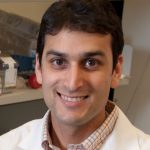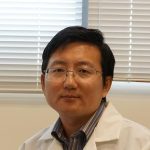Thank You for Supporting Cancer Research | A Message from the V Foundation
Read moreState: Maryland
Srinivasan Yegnasubramanian, M.D., Ph.D.
Karen Sandell Sfanos, Ph.D.
Human-associated bacterial communities (e.g., the “microbiome”) are an integral part of the healthy human body, yet pathogenic shifts leading to increased and/or decreased diversity in the healthy-state microbiome composition are linked to disease development. We hypothesize that prostate infections that result from pathogenic shifts in the urinary tract microbiome contribute to prostate cancer development. As such, we aim to investigate associations between altered urogenital microbiome signatures and the presence of prostate cancer and/or high grade disease. Furthermore, we aim to correlate urinary tract microbiome signatures to prostatic inflammation in prostate cancer patients, as we hypothesize that microorganisms that may contribute to prostate cancer etiology do so via the induction of chronic inflammation in the prostate. These studies can be coupled to ongoing studies in our laboratory aimed at the identification of microbial signatures in prostate cancer tissues, and ongoing efforts to identify causal microorganisms in prostate cancer etiology. The proposed research project will represent an essential initial study linking urinary tract microbiome to genitourinary disease. Whereas the project is primarily focused on prostate cancer, this work may lay the important groundwork for additional studies linking urinary tract microbiome to other genitourinary malignancies such as kidney, urothelial, or bladder cancer.
Patrick Brown, M.D.
Funded by the Dick Vitale Gala
Leukemia is a type of blood cancer. Leukemia is the most common cancer in children. Overall, the chance that a child with leukemia can be cured is high. However, when leukemia occurs in babies, the chance of cure is much lower. We are trying to find new and better treatments for these babies. These leukemias have abnormal ways of organizing their DNA. This may be making them harder to cure. We want to understand this better. We want to find new treatments that can fix this abnormal DNA organization. We hope this will help cure more babies.
Jianfei Qi, Ph.D.
Prostate cancer is a common cause of death among men. Current treatment includes hormone therapy that targets the androgen receptor (AR). The AR promotes the growth of prostate cancer. Unfortunately, prostate cancer cells remain resistant to current therapy. This is partly due to the formation of active forms of AR. We need to understand how active forms of AR arise. Thus, we can discover therapies that will not become resistant to treatment. The JMJD1A protein plays an important role in this process. In this study we will look at how JMJD1A promotes the generation of active AR forms. JMJD1A may regulate several other proteins (e.g. HUWE1, c-Myc and HNRNPA1) to do this. We will block the expression of these proteins to see if prostate cancer cells become sensitive to hormone therapy. Our experiments include cell culture and mouse tumor models. Our study will stimulate the interest to develop inhibitors that block the activity of JMJD1A or the proteins it regulates. The inhibitors will serve as effective therapies for prostate cancer.
Daniele Gilkes, Ph.D.
The spread of cells from one organ to another organ is the main cause of death for cancer patients. When cancer cells continue to grow and form a tumor some of them run out of oxygen. Cancer cells learn to deal with these low levels of oxygen by switching on genes that help them survive even under stress. As a result, rather than dying these oxygen-deprived cells become even more powerful and can continue to survive even when treated with cancer drugs. To investigate how these cells function we must find these powerful cells within a tumor. To do this we designed a trick to make the cells change color when they do not have enough oxygen. We can use this color to find and collect the cells from within a tumor. Once we collect the cells, we will try to determine what makes them so powerful and use this information to try to design methods to kill these deadly cells.










